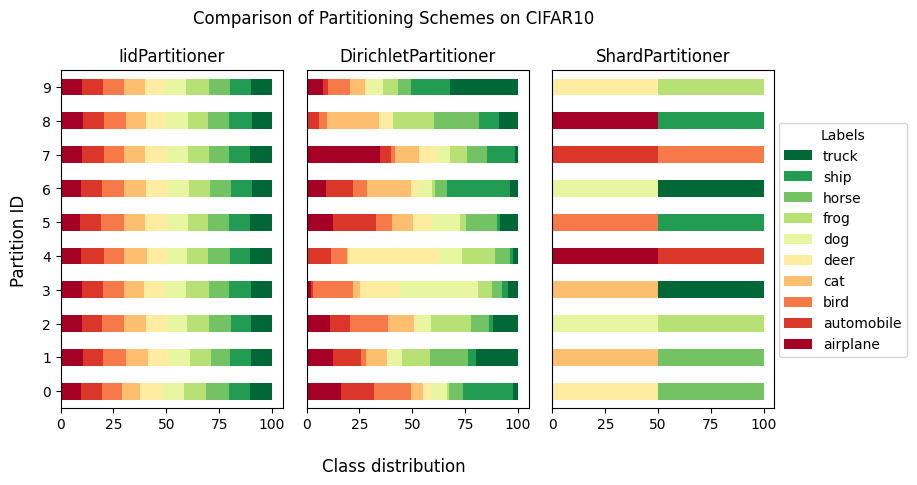Flower Datasets#
Flower Datasets (flwr-datasets) is a library that enables the quick and easy creation of datasets for federated learning/analytics/evaluation. It enables heterogeneity (non-iidness) simulation and division of datasets with the preexisting notion of IDs. The library was created by the Flower Labs team that also created Flower : A Friendly Federated Learning Framework.
Flower Datasets Framework#
Install#
python -m pip install "flwr-datasets[vision]"
Check out all the details on how to install Flower Datasets in Installation.
Tutorials#
A learning-oriented series of tutorials is the best place to start.
How-to guides#
Problem-oriented how-to guides show step-by-step how to achieve a specific goal.
References#
Information-oriented API reference and other reference material.
Flower Datasets main package. |
Reference docs
Main features#
Flower Datasets library supports:
Downloading datasets - choose the dataset from Hugging Face’s
dataset(link)(*)Partitioning datasets - choose one of the implemented partitioning scheme or create your own.
Creating centralized datasets - leave parts of the dataset unpartitioned (e.g. for centralized evaluation)
Visualization of the partitioned datasets - visualize the label distribution of the partitioned dataset (and compare the results on different parameters of the same partitioning schemes, different datasets, different partitioning schemes, or any mix of them)
Note
(*) Once the dataset is available on HuggingFace Hub it can be immediately used in Flower Datasets (no approval from the Flower team needed, no custom code needed).

Thanks to using Hugging Face’s datasets used under the hood, Flower Datasets integrates with the following popular formats/frameworks:
Hugging Face
PyTorch
TensorFlow
Numpy
Pandas
Jax
Arrow
Here are a few of the Partitioner s that are available: (for a full list see link )
Partitioner (the abstract base class)
PartitionerIID partitioning
IidPartitioner(num_partitions)Dirichlet partitioning
DirichletPartitioner(num_partitions, partition_by, alpha)Distribution partitioning
DistributionPartitioner(distribution_array, num_partitions, num_unique_labels_per_partition, partition_by, preassigned_num_samples_per_label, rescale)InnerDirichlet partitioning
InnerDirichletPartitioner(partition_sizes, partition_by, alpha)PathologicalPartitioner
PathologicalPartitioner(num_partitions, partition_by, num_classes_per_partition, class_assignment_mode)Natural ID partitioner
NaturalIdPartitioner(partition_by)Size partitioner (the abstract base class for the partitioners dictating the division based the number of samples)
SizePartitionerLinear partitioner
LinearPartitioner(num_partitions)Square partitioner
SquarePartitioner(num_partitions)Exponential partitioner
ExponentialPartitioner(num_partitions)more to come in the future releases (contributions are welcome).
How To Use the library#
Learn how to use the flwr-datasets library from the Quickstart examples .
Distinguishing Features#
What makes Flower Datasets stand out from other libraries?
Access to the largest online repository of datasets:
The library functionality is independent of the dataset, so you can use any dataset available on 🤗Hugging Face Datasets, which means that others can immediately benefit from the dataset you added.
Out-of-the-box reproducibility across different projects.
Access to naturally dividable datasets (with some notion of id) and datasets typically used in centralized ML that need partitioning.
Customizable levels of dataset heterogeneity:
Each
Partitionertakes arguments that allow you to customize the partitioning scheme to your needs.Partitioning can also be applied to the dataset with naturally available division.
Flexible and open for extensions API.
New custom partitioning schemes (
Partitionersubclasses) integrated with the whole ecosystem.
Join the Flower Community#
The Flower Community is growing quickly - we’re a friendly group of researchers, engineers, students, professionals, academics, and other enthusiasts.